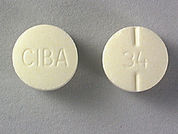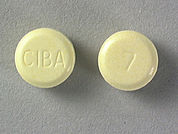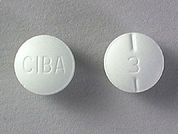Ritalin
Ritalin generic name: Methylphenidate Er (La), Methylphenidate Hcl, Methylphenidate Er, Methylphenidate Hcl Cd
What is Ritalin used for?
This medication is used to treat attention deficit hyperactivity disorder - ADHD. It works by changing the amounts of certain natural substances in the brain. Methylphenidate belongs to a class of drugs known as stimulants. It can help increase your ability to pay attention, stay focused on an activity, and control behavior problems. It may also help you to organize your tasks and improve listening skills. This medication is also used to treat a certain sleep disorder (narcolepsy).
CHEMICAL NAME
DRUG TYPE
Attention DisordersRitalin Prices
Searching for the lowest prices
What does Ritalin look like?
View all Ritalin Image Information (3)Ritalin Frequently Asked Questions
If someone has overdosed and has serious symptoms such as passing out or trouble breathing, call 911. Otherwise, call a poison control center right away. US residents can call 1-800-222-1222. Canada residents can call 1-844-764-7669. Symptoms of overdose may include: vomiting, agitation, confusion, sweating, flushing, muscle twitching, hallucinations, seizures, loss of consciousness.
IMPORTANT: HOW TO USE THIS INFORMATION: This is a summary and does NOT have all possible information about this product. This information does not assure that this product is safe, effective, or appropriate for you. This information is not individual medical advice and does not substitute for the advice of your health care professional. Always ask your health care professional for complete information about this product and your specific health needs.
Ritalin Dosage and Form Information
Tablet
Ritalin Alternatives
Brand Name Examples
Concerta
Prices starting at
$ 433.49Metadate Cd
Prices starting at
$ 669.49Relexxii
Prices starting at
$ 398.17Methylin
Prices starting at
$ 96.90Aptensio Xr
Prices starting at
$ 281.17Generic Examples
Methylphenidate Er (La)
Prices starting at
$ 136.27Methylphenidate Hcl
Other Methylphenidate Hcl forms and strengths:
Tablet
Methylphenidate Hcl 5 Mg Tablet
Methylphenidate Hcl 10 Mg Tablet
Methylphenidate Hcl 20 Mg Tablet
Tablet Chewable
Methylphenidate Hcl 2.5 Mg Tablet Chewable
Methylphenidate Hcl 5 Mg Tablet Chewable
Methylphenidate Hcl 10 Mg Tablet Chewable
Solution Oral
Methylphenidate Hcl 5 Mg/5 Ml Solution Oral
Methylphenidate Hcl 10 Mg/5 Ml Solution Oral
Prices starting at
$ 9.14Methylphenidate Er
Other Methylphenidate Er forms and strengths:
Capsule ER Biphasic 30-70
Methylphenidate Er 10 Mg Capsule ER Biphasic 30-70
Methylphenidate Er 20 Mg Capsule ER Biphasic 30-70
Methylphenidate Er 30 Mg Capsule ER Biphasic 30-70
Methylphenidate Er 40 Mg Capsule ER Biphasic 30-70
Methylphenidate Er 50 Mg Capsule ER Biphasic 30-70
Methylphenidate Er 60 Mg Capsule ER Biphasic 30-70
Tablet ER 24 Hr
Methylphenidate Er 18 Mg Tablet ER 24 Hr
Methylphenidate Er 27 Mg Tablet ER 24 Hr
Methylphenidate Er 36 Mg Tablet ER 24 Hr
Methylphenidate Er 45 Mg Tablet ER 24 Hr
Methylphenidate Er 54 Mg Tablet ER 24 Hr
Methylphenidate Er 63 Mg Tablet ER 24 Hr
Methylphenidate Er 72 Mg Tablet ER 24 Hr
Capsule ER Sprinkle Biphasic 40-60
Methylphenidate Er 10 Mg Capsule ER Sprinkle Biphasic 40-60
Methylphenidate Er 15 Mg Capsule ER Sprinkle Biphasic 40-60
Methylphenidate Er 20 Mg Capsule ER Sprinkle Biphasic 40-60
Methylphenidate Er 30 Mg Capsule ER Sprinkle Biphasic 40-60
Methylphenidate Er 40 Mg Capsule ER Sprinkle Biphasic 40-60
Methylphenidate Er 50 Mg Capsule ER Sprinkle Biphasic 40-60
Methylphenidate Er 60 Mg Capsule ER Sprinkle Biphasic 40-60
Tablet ER
Methylphenidate Er 10 Mg Tablet ER
Methylphenidate Er 20 Mg Tablet ER
Capsule ER Biphasic 50-50
Methylphenidate Er 10 Mg Capsule ER Biphasic 50-50
Methylphenidate Er 20 Mg Capsule ER Biphasic 50-50
Methylphenidate Er 30 Mg Capsule ER Biphasic 50-50
Methylphenidate Er 40 Mg Capsule ER Biphasic 50-50
Methylphenidate Er 60 Mg Capsule ER Biphasic 50-50
Prices starting at
$ 69.12Methylphenidate Hcl Cd
Prices starting at
$ 93.10

